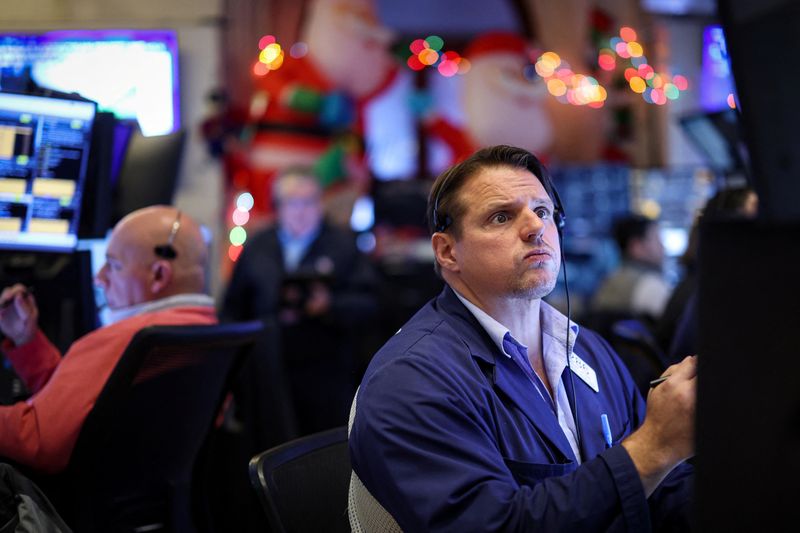By Chibuike Oguh, Purvi Agarwal and Shashwat Chauhan
NEW YORK (Reuters) -Wall Street’s benchmark rose on Wednesday and a rally in technology stocks lifted the Nasdaq above the 20,000-point mark for the first time after a U.S. inflation report fueled expectations of a Federal Reserve rate cut.
The declines were dragged down by health insurers when US lawmakers introduced a bill seen as limiting their profits.
Five of the 11 major S&P 500 sectors advanced, led by gains in communications services, technology and consumer discretionary services.
A Labor Department report shows that U.S. consumer prices rose the most in seven months in November, although largely in line with market expectations.
The Dow Jones Industrial Average fell 99.27 points, or 0.22%, to 44,148.56, the S&P 500 gained 49.28 points, or 0.82%, to 6,084.19 and gained 347.65 points, or 1.77%, to 20,034.89.
“Nasdaq is rallying on the prospect of a rate cut next week and has room to move higher,” said Peter Cardillo, chief market economist at Spartan Capital Securities.
Markets are pricing in a greater than 96% chance that the Fed will cut rates by 25 basis points next week, compared to an 86% chance before the data, according to CME’s FedWatch Tool. Bets were up after Friday’s employment report, which showed a rise in unemployment alongside strong job growth.
The yield on US 10-year benchmark bonds rose 5.2 basis points to 4.271%.
“The stock market seems to be breathing a sigh of relief that this is another stable report,” said Wasif Latif, chief investment officer at Sarmaya Partners in New Jersey. “There are no surprises. It appears the stock market was bracing for a higher-than-expected figure.”
Shares of Tesla (NASDAQ:) rose nearly 6% to a record high as the electric vehicle maker continued its rally in the wake of the US presidential election.
Nvidia (NASDAQ:) and other mega-cap growth stocks, including Alphabet (NASDAQ:) and Amazon (NASDAQ:), also finished higher, rising between 1.2% and 5.5%. Apple (NASDAQ:) fell 0.5%
Pharmacy benefit managers including Cigna (NYSE:), CVS Health (NYSE:) and UnitedHealth Group (NYSE:) lost ground after a bipartisan group of lawmakers introduced a bill that would force health insurers or drug brokers to divest their pharmacy operations bump .
GameStop (NYSE:) gained 7.5% after the video game retailer reported third-quarter profits thanks to cost-cutting efforts.
Broadcom (NASDAQ:) rose 6.6% on a report that Apple is working with the company to develop its first server chip specifically designed for artificial intelligence.
Macy’s (NYSE:) lost 0.8% after department store Bellwether cut its annual earnings forecast as continued weakness in demand clouded expectations for the holiday shopping season.
On the NYSE, advancing issues outnumbered declining issues by a ratio of 1.27 to 1. On the Nasdaq, 2,287 stocks rose and 2,029 fell as advancing issues outnumbered declining stocks by a ratio of 1. 13 to 1.

The S&P 500 posted 22 new 52-week highs and 6 new lows, while the Nasdaq Composite posted 127 new highs and 118 new lows.
About 14.25 billion shares traded on U.S. exchanges, compared with the average of 14.35 billion over the past 20 sessions.


